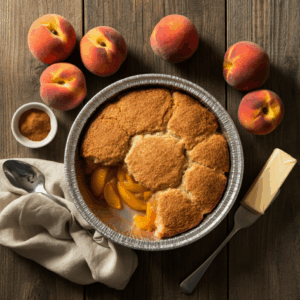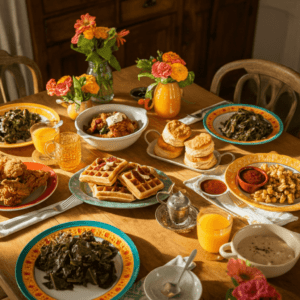Explore the rich and diverse world of soul food through seasonal catering menus inspired by the deep flavors of Southern cuisine. Originating from Southern African American culture, soul food features iconic dishes such as fried chicken, cornbread, and collard greens, emphasizing hearty and flavorful meals perfect for communal gatherings and family gatherings.
With a strong historical and cultural backdrop, soul food evolved from African culinary traditions blended with Southern ingredients, influenced by African, Native American, and European practices. This unique culinary style showcases ingredients like black-eyed peas, sweet potatoes, and savory spices, cooked using techniques such as slow-cooking, frying, and baking. The culinary techniques and traditions reflect a rich cultural heritage.
Seasonal menus offer a fresh take on classic soul food, highlighting local produce and flavors distinct to each season. From spring’s fresh greens and lighter fare to winter’s warm soups and cozy casseroles, these menus cater to a variety of tastes and occasions. Seasonal ingredients and regional variations are essential components in creating these diverse menus.
Incorporating Southern flavors into catering menus enhances events with comforting dishes that reflect Southern hospitality and tradition. By offering popular dishes like barbecue ribs, mac and cheese, pecan pie, and hushpuppies, you can create a memorable dining experience that resonates with guests and enhances the flavor profiles presented.
What Is Soul Food?
Soul food is a traditional cuisine that originates from Southern African American culture and includes dishes like fried chicken, cornbread, collard greens, and gumbo.
Soul food emphasizes hearty, flavorful meals that are often shared during community gatherings and potluck events.
The History of Soul Food
The history of soul food originates from African American culinary traditions during slavery, utilizing limited resources to create meals.
Soul food evolved post-emancipation, incorporating ingredients from Southern agriculture and African influences, showcasing the essence of food sustainability.
Soul food dishes, like fried chicken, collard greens, and cornbread, symbolize cultural heritage and community.
Soul food became a staple in Southern cuisine, reflecting African American resilience and creativity.
How Did Soul Food Evolve?
Soul food evolved from African culinary traditions combined with Southern U.S. ingredients and cooking techniques.
Soul food’s evolution was influenced by African American migration, introducing urban flavors and regional ingredients, showcasing the impact of food history.
Soul food integration of new ingredients, such as seafood, enriched traditional recipes, reflecting community history and cultural identity.
What Influences Shaped Soul Food?
Soul food is influenced by African, Native American, and European culinary practices, creating a unique blend of flavors.
African influence is seen in the use of okra and savory spices.
Native American influence is evident through ingredients like corn and beans.
European influence appears in herbs and cream sauces.
Soul food embodies regional cuisine and reflects comfort and community traditions and food culture.
Soul Food Ingredients and Cooking Techniques
Soul food ingredients include:
- black-eyed peas
- sweet potatoes
- collard greens
- cornmeal
- savory spices like paprika and cayenne pepper
- fresh produce and herbs
Soul food cooking techniques involve:
- slow-cooking
- frying
- baking
- the use of cast-iron skillets to enhance flavor
- flavor enhancement through spices and herbs
Combining seasonal ingredients and fresh herbs is crucial in soul food to highlight its rich flavors. Utilizing local ingredients and focusing on food sustainability further enhances the flavor profiles.
What Are the Key Ingredients in Soul Food?
Key ingredients in soul food include fried chicken, collard greens, cornbread, mac and cheese, ham hocks, and pulled pork.
Soul food also uses mustard greens, turnip greens, fresh herbs, and savory spices.
Unique ingredients like hushpuppies and catfish also play a significant role. These ingredients define soul food’s comforting and flavorful nature.
How Is Soul Food Typically Cooked?
Soul food is typically cooked using methods such as braising, frying, baking, and simmering.
Braising tenderizes meats and enhances flavors. Frying is used for chicken and fish to create a crispy texture.
Baking is used for dishes like cornbread and casseroles. Simmering creates rich, savory stocks for soups and stews.
Seasonal Soul Food Menus
Seasonal soul food menus offer dishes specific to Southern cuisine that change with the seasons, highlighting local produce and fresh ingredients. Emphasizing food sustainability, these seasonal recipes reflect the availability of ingredients.
These menus include items like spring greens and winter casseroles, tailored for family gatherings and festive occasions.
Spring Menu: Fresh Greens and Lighter Fare
A spring menu in soul food features fresh greens and lighter fare, celebrating seasonal ingredients and fresh produce.
Key dishes include:
- sautéed collard greens
- spring vegetable salads
- black-eyed peas
- fried catfish with zesty remoulade
Ingredients like asparagus, sweet peas, and juicy tomatoes enhance the spring menu.
Herb-infused cornbread or citrusy cornbread complements the meal.
Light desserts with strawberries or peaches, such as cobbler or tart, embody spring flavors.
Summer Menu: Grilled Meats and Cool Sides
Summer menu features in soul food include grilled meats like barbecue ribs and chicken, paired with cool sides like cucumber salads and coleslaw.
Fresh seasonal ingredients from local markets enhance these dishes, creating an ideal atmosphere for outdoor gatherings and seasonal celebrations.
Classics such as cornbread and fresh fruits, like watermelon and berries, add texture and visual appeal.
Fall Menu: Hearty Stews and Comforting Classics
Fall menus feature hearty stews and comforting classics like gumbo, jambalaya, and collard greens.
These dishes use seasonal produce like sweet potatoes and carrots for rich flavors.
Highlights include:
- mac and cheese
- fried chicken
- cornbread
Seasonal desserts like sweet potato pie and apple cobbler use warming spices like cinnamon and nutmeg.
Fall menus offer flavors that reflect the richness of the season and the warmth of home cooking.
Winter Menu: Warm Soups and Cozy Casseroles
Winter menus feature warm soups and cozy casseroles that offer comfort during cold months.
Dishes like chicken and dumplings, gumbo, jambalaya, and baked macaroni and cheese create hearty meals.
These meals use seasonal ingredients, making them ideal for holidays and gatherings.
Collard greens and sweet potato casserole add depth and sweetness to winter feasts.
Incorporating Southern Flavors in Catering Menus
Incorporating Southern flavors in catering menus involves adding traditional Southern dishes like fried chicken, collard greens, and cornbread to event menus. Catering services often include these traditional dishes to ensure authenticity.
Southern flavors enhance catering by providing rich, hearty dishes that reflect the warmth of Southern hospitality and cultural influences.
Combining classic Southern recipes with modern culinary techniques creates unique and memorable catering experiences.
How Can Southern Flavors Elevate a Catering Menu?
Southern flavors elevate a catering menu by introducing classic dishes like fried chicken, collard greens, and pecan pie that appeal to a broad range of tastes.
Southern cuisine fosters a welcoming atmosphere and nostalgic connection among guests through comforting and familiar foods.
Incorporating Southern flavors creates a memorable dining experience by harmonizing with event themes and reflecting Southern hospitality.
What Are Some Popular Southern Dishes to Include in Catering Menus?
Popular Southern dishes for catering menus include:
- barbecue ribs
- mac and cheese
- collard greens
- fried green tomatoes
- jambalaya
- pecan pie
- peach cobbler
- catfish
These dishes showcase traditional Southern flavors and are suitable for events like weddings and family reunions.
Southern cuisine in catering offers a comforting blend of tastes and textures.
Tips for Hosting a Soul Food Inspired Event
To host a soul food inspired event, follow these tips:
- Select classic soul food dishes like fried chicken, collard greens, cornbread, and peach cobbler.
- Use Southern-inspired decor such as checkered tablecloths and mason jar centerpieces.
- Create a playlist with blues, jazz, and gospel music to set the tone.
- Arrange comfortable seating for a relaxed dining experience.
- Offer sweet tea and lemonade as traditional beverage options.
These tips ensure an authentic and enjoyable soul food event.
How to Create a Welcoming Atmosphere
To create a welcoming atmosphere for a soul food inspired event, start with comfortable seating and inviting decor that embodies Southern hospitality.
Use vibrant table linens and culturally inspired centerpieces to reflect the rich heritage of soul food.
Arrange seating to facilitate interaction with communal tables and cozy nooks for different group sizes.
Play soulful music to enhance the mood and make guests feel relaxed.
These elements together create a warm, welcoming atmosphere that encourages connection and enjoyment.
How to Incorporate Music and Decor to Enhance the Theme
To enhance the theme of a soul food-inspired event, incorporate music and decor strategically. Music like Motown or gospel sets the mood and aligns with the theme.
Decor elements such as vibrant tablecloths with traditional patterns, rustic wooden centerpieces, and vintage Southern photographs enhance the visual experience.
Bright flowers and soft candlelight further elevate the ambiance, creating an immersive experience.
How to Accommodate Dietary Restrictions and Preferences
To accommodate dietary restrictions and preferences, provide a variety of dishes like vegetarian, gluten-free, and low-sugar options at events, and include seasonal ingredients to enhance the flavor profiles.
Replace ingredients in classic recipes for healthier alternatives, such as using quinoa instead of white rice. This can be part of your recipe variations to meet diverse dietary preferences.
Offer sauces, spices, and herbs separately to allow guests to personalize meals and enhance the dining experience.
Ensure all guests feel included by adapting traditional recipes, such as vegetarian soul food and gluten-free options, to meet diverse needs.
Frequently Asked Questions
What is soul food?
Soul food is a type of cuisine that originated in the southern United States. It is known for its rich, hearty flavors and use of ingredients such as cornmeal, collard greens, fried chicken, and pork.
How is soul food different from other types of food?
Soul food is unique in that it combines traditional African ingredients and cooking techniques with southern influences, resulting in a flavorful and comforting style of cooking. This culinary tradition reflects the cultural heritage and regional cuisine of the southern United States.
What are some popular dishes in soul food?
Some popular dishes in soul food include fried chicken, collard greens, black-eyed peas, macaroni and cheese, cornbread, and sweet potatoes. These dishes often feature a combination of savory and sweet flavors.
What makes a catering menu inspired by southern flavors?
A catering menu inspired by southern flavors will feature traditional soul food dishes that are typically served in the southern United States, using fresh and locally sourced ingredients to capture the essence of southern cuisine. Dishes such as gumbo, jambalaya, and barbecue are perfect examples of this.
What types of events are suitable for a soul food catering menu?
Soul food catering menus are perfect for a variety of events, from casual gatherings to formal events. They are a popular choice for celebrations such as weddings, corporate events, family reunions, and holiday feasts.
Can a soul food catering menu be customized for different dietary restrictions?
Yes, a soul food catering menu can be customized to accommodate different dietary restrictions. This can include options for vegetarian, vegan, gluten-free, and allergy-friendly dishes, while still capturing the essence of southern flavors. It is important to communicate any dietary restrictions to the caterer beforehand to ensure that all guests can enjoy the delicious soul food dishes. Options such as catfish, peach cobbler, hushpuppies, and incorporating fresh produce can help cater to diverse preferences.





